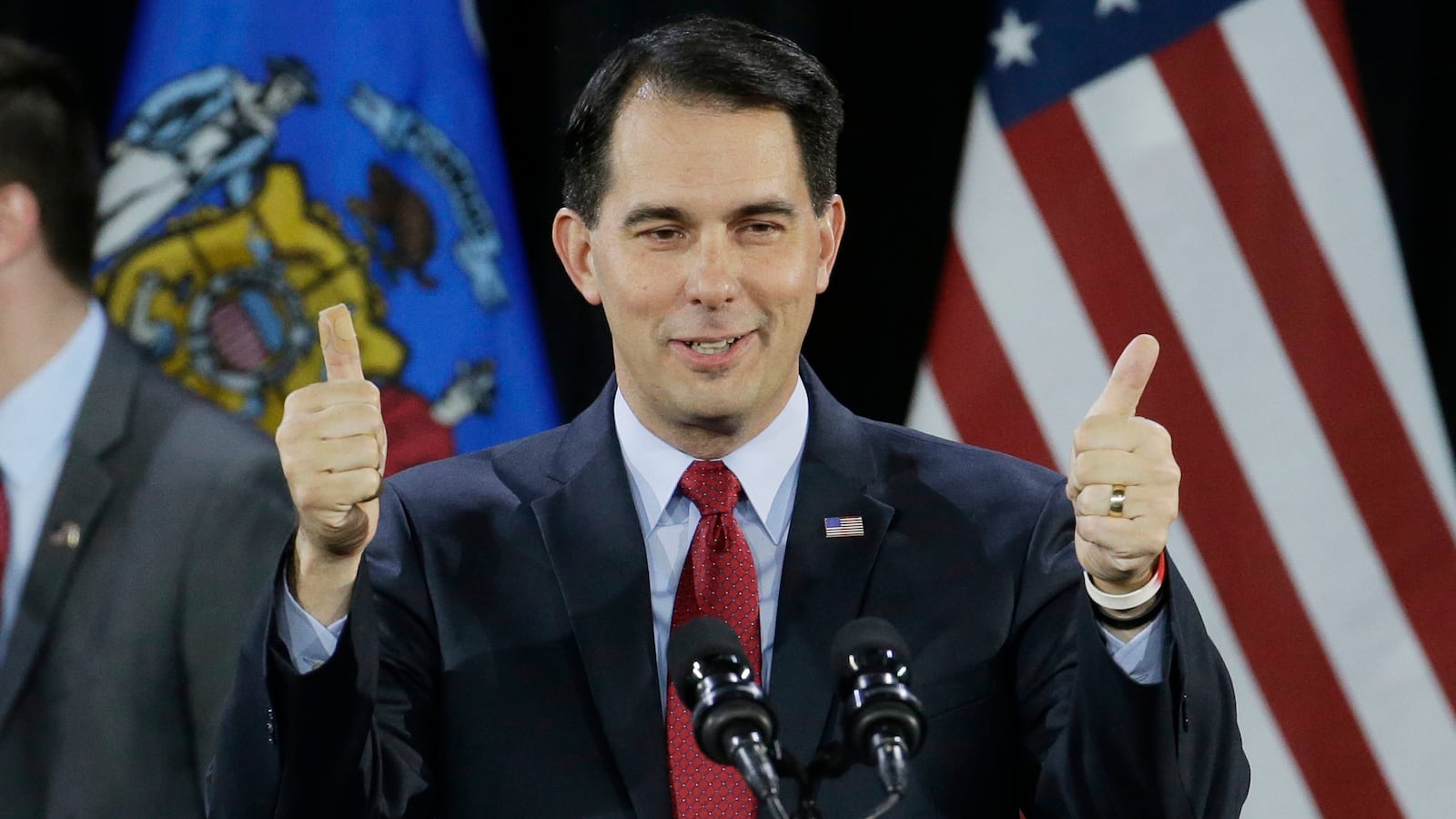The Scott Walker Election Night party was over so quickly, there was still beer left. Revelers—if you could call the sedate suburbanite attendees that—left half-empty plastic cups in neat little formations around the edges of the stage so that just 30 minutes after Walker walked off, only the press corps and the cleanup crew were left. The rally had been eagerly attended, was sporadically enthusiastic, and left almost no impression once it was over. It was a lot like Scott Walker that way.
He is the drone official, the bland-faced human-resources manager tasked with dropping the axe. No one hates him because they can only barely remember the details of the conversation. He is not a good candidate, he is a good-enough candidate.
Walker has won three state-wide elections, yes, but the dynamics of each of those races have been so similar that it’s tough to argue that Walker has emerged from them with any skills that he didn’t have before. What he’s gained with each succeeding election is new funders, who may be convincing themselves of a hidden charisma when what they should be doing is marveling at the success he’s had without it.
You might argue that he’s winning because of his ideas! But looking to Wisconsin as a proving ground for Republican policy, or even as proof of the arguments Republicans make to voters, and one has to contend with Wisconsin remaining stubbornly not-that-conservative.
Nothing about the exit-poll results besides Walker’s win itself suggests that Wisconsin voters are especially enamored of conservative ideals. They were evenly divided over how Walker handled the Affordable Care Act (or didn’t handle it, really); they were almost evenly divided in their view of government unions (slightly more with an unfavorable view); they were almost evenly divided over whether “government is doing too many things that should be left to individuals.” About half of voters had a negative view of the Democratic Party. About half had a negative view of the Republican Party. The only policy issue that rallied a significant majority of Wisconsin voters was the minimum wage—two-thirds favored raising it.
None of this sounds like proof that Walker has succeeded in making conservative arguments more appealing to more voters, or that he’s gained more voters because he’s made conservative arguments. (The same rich, white, married, male church-going coalition pushed him over the top this time as last.) Rather, Scott Walker may have succeeded because he’s been able to make all of his races about Scott Walker.
This is an especially neat trick given how boring Walker is—or maybe that’s why it works.
Targeted by a recall, all Walker really had to do was prove to some slim margin of independents that he wasn’t *that bad.* The biggest challenge Walker faced in his race against Mary Burke was to keep the election from becoming about something that might actually get people excited. Walker addressed “war on women” accusations indirectly with a powerful ad about domestic violence; he maneuvered his way out of a direct confrontation on equal pay with an ad that touted his support the equal-pay laws that existed before he repealed the expansion of those laws.
He took paper-pushing and made it seem heroic. Indeed, the fight over Act 10, which so galvanized labor and progressives, had the perverse effect of putting Walker in the role of the sober statesman and efficiency-minded bureaucrat. When pollsters asked voters about the issue and its fallout, the very phrasing of the question tilted the field toward Walker: Marquette University asked if “all the changes in state government” over the last few years “will make the state better or worse off in the long run.” Think like a typically disaffected and frustrated voter: “All the changes in state government” sounds pretty good! In the final poll, among likely voters, 53 percent said “all the changes” would make the state better and 40 percent said worse.
That might be the most meaningful question of the election, because it’s the one that could, you know, actually be answered. Of course, if Walker uses this victory to bring his inoffensive act to the primary stage, he’ll be able to take credit for making changes without having to answer for what they wrought.
Walker’s 8 percentage-point victory over Mary Burke may have seemed like vindication to other Republicans, and certainly pundits used it as a reason to moon over the possibility of a Walker presidential run, but Walker himself treated Tuesday night like any other campaign stop. He could have used the national spotlight to showcase the qualities that make him an ostensibly attractive national candidate, but instead Walker delivered essentially the same stump speech he’s given going on two years now—it’s long on Washington-vs.-Wisconsin rhetoric, but short on policy specifics.
Now, perhaps Walker demurred from grandstanding because such preening is antithetical to good Midwestern values, or perhaps he sensed that the media was too busy counting Senate seats to pay attention. Or perhaps Scott Walker delivered the same basic speech he always does because Scott Walker does not have that much to say.





